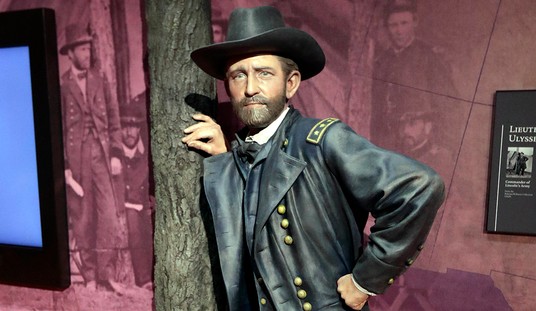Forget asking if the New Deal was a wrong turn. George Clooney wants to ban car engines.
“George Clooney Wants Democrats Like In His Movies: They’d Ban the Car Engine,” Tim Graham writes at Newsbusters:
George Clooney has begun a publicity tour for his new political thriller The Ides of March (which debuts in theaters October 7). John Horn of the Los Angeles Times says the Clooney character has a platform “so uncompromisingly left-leaning it might make Fox News commentators burst into flames.”
Not only that, Clooney’s character proposes the U.S. government ban the internal combustion engine. Clooney says “make it happen.” He actually believes that “these are the kind of leadership things I would love to see.” Horn explained:
Clooney’s Gov. Mike Morris is poised to take the Democratic nomination with a platform so uncompromisingly left-leaning it might make Fox News commentators burst into flames. He opposes the death penalty, foreign military intervention and even internal combustion engines and supports gay marriage, mandatory national volunteer service and higher taxes for the richest Americans.
….If real-life Democrats end up taking inspiration from the Mike Morris character and his stump speeches, Clooney will hardly be upset. On climate change and oil, for instance, the governor proposes that the United States do away with the internal combustion engine.
“If we’re cut off from oil, we will find a way to power our cars. So say it and make it happen,” Clooney said. “It’s not ridiculous. It is possible. And these are the kind of leadership things I would love to see and could be argued about. People will say, ‘It’s just actors.’ But I truly believe it.”
Well, that’s funny, I knew someone would do it. I’m a little disappointed it’s you. I mean, everyone is a little ashamed of you right now, George.
But beyond repurposing Clooney’s own insult to a reporter innocently asking him a question about his work during the same press junket, perhaps the initial rebuttal to the above statement should come from his own profession:
Besides, if you really do believe, in your heart of hearts, that America should do away with the internal combustion engine, then put your money where your mouth is:
- Never work on a film where the equipment is shipped to the set or the location shoot in a truck with an internal combustion engine.
- Never work on a film with a night shoot where the electricity for the lights come from a generator with an internal combustion engine.
- Demand that your studio avoid sending prints out to theaters where they get deliveries of products such as food and drink concessions via trucks with internal combustion engines.
- Never buy food in a grocery store where the products are delivered via trucks with internal combustion engines.
- If, God forbid, you or a loved one ever require an ambulance for emergency care, vow to turn away any that use an internal combustion engine.
- Vow to never fly in a jet plane again, until airlines stop using tractors with internal combustion engines to shuttle planes around the airport and service hangers.
- And so on.
In other words, there goes the movie business, as we know it. Not to mention life in general as we know it.
One irony behind Clooney’s idiotic statement, yet another example of the left wanting to turn the clock back on progress, is that takes for granted the environmental benefits of the automobile. Or as Dwight R. Lee, an economics professor at SMU wrote in 2007, “Thank You, Internal-Combustion Engine, for Cleaning up the Environment:”
The internal-combustion engine began improving the environment, however, long before global warming became a concern. Consider the fact that in 1900 a large percentage of the available horsepower really was horse power, or mule power, or ox power. As the power of the internal-combustion engine began to be substituted for animal power in the early 1900s, we began to substitute the emissions coming out of the tailpipes of cars and trucks for those coming out of the tailpipes of animals. The result was that the environment started becoming far cleaner and healthier.
Consider horse manure’s effect on the environment and health of New Yorkers in 1900. Robert Fogel, a Nobel Prize-winning economic historian, writes:
We complain a lot about air pollution today, but there were 200,000 horses in New York City, at the beginning of the 20th century defecating everywhere. And when you walked around in New York City, you were breathing pulverized horse manure—a much worse pollutant, than the exhausts of automobiles. Indeed in the United States, the automobile was considered the solution to the horse problem because pulverized horse manure carried a lot of deadly pathogens.
No serious person denies that photochemical smog from gas-powered vehicles is a health risk. It would be silly to do so. It would be even sillier, however, to deny Fogel’s observation that the air and water pollution from horse manure was a far greater health risk than the pollution from cars and trucks. Diseases such as cholera, typhoid, typhus, yellow fever, and diphtheria were responsible for the deaths of tens of thousands of Americans in the early twentieth century. As cars and trucks began replacing horses and other beasts of burden, these deaths began to decline dramatically. Medical improvements get some of the credit, but most of the credit during the early decades of the twentieth century goes to the reduced filth in the environment from animal waste.
The environmental benefits from the internal-combustion engine have not been confined to towns and cities. Before the power of internal combustion was harnessed, beasts of burden were adding greatly to the pollution generated by meat-producing animals, such as cows, pigs, and chickens in agricultural communities. By eliminating the need for horses, mules, and oxen on farms, tractors, trucks and other types of gas-powered farm machinery limited the problem of animal waste from agriculture almost entirely to feed lots that environmentalists, with justification, still complain about. It would be nice to hear them acknowledge that they would have even more to complain about without the internal-combustion engine.
Another environmental benefit that internal combustion seldom receives credit for is that it eliminated the need to grow food for millions of farm animals. It has been estimated that in 1910 about 25 percent of U.S. acreage devoted to growing crops was being used to grow food for the farm animals that were soon replaced by motorized farm equipment. Much of that land is now forestland, with the number of trees absorbing the greenhouse gas carbon dioxide much greater than it would have been without the internal combustion engine.
Based on the animal waste and the diseases that have been eliminated by the internal-combustion engine, plus the additional forestland it has made possible, environmentalists should be celebrating motorized vehicles on Earth Day instead of destroying them with sledgehammers. And the reason for celebrating internal combustion is even stronger now that we have evidence that by eliminating all those barnyard animals, the engine has also eliminated vast amounts of methane from animal flatulence—a gas with far more greenhouse potency than the carbon dioxide produced by gasoline engines.
As we noted during one of our earlier looks at “progressives” who in reality want to turn the clock back on technological progress, gnomish nonagenarian Stalinist folkie Pete Seeger once told the New York Times:
I like to say I’m more conservative than Goldwater. He just wanted to turn the clock back to when there was no income tax. I want to turn the clock back to when people lived in small villages and took care of each other.
Doesn’t sound like there would be much of a movie industry in that pre-industrial world. (The New York Times’ Internet paywall would similarly be screwed, but that’s a whole ‘nother post.)









Join the conversation as a VIP Member